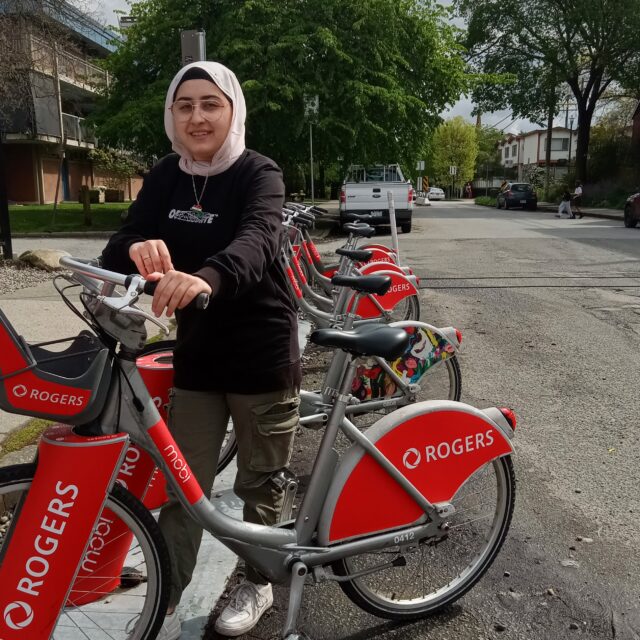Vancouver Bike Share Engages Youth Through Equity Program
by Odochi Akwani, Writer and Content Manager
May 3, 2024
Launched in fall 2022, Vancouver Bike Share’s equity program offers a discounted Youth Community Pass to residents aged 12-18.

The ability to get where you need to go without depending on others can offer a tremendous sense of independence. Many young people rely on their parents, guardians, or other adults in order to access everyday destinations like school, activities, friends, or leisure. This proves even more difficult for families without personal vehicles or the budget to afford public transportation. Vancouver Bike Share’s equity program looks to solve those barriers through subsidized and free bike share passes available to 12-18 year olds at four schools within the metro area, with hopes to expand.
“One benefit of our equity pass is that it allows us to reduce the age requirement from 16 to 12,” says Community Pass and Corporate Program Coordinator Taylor MacVittie. “It’s only through our equity pass that youth aged 12-16 can access bike share in Vancouver.”
Vancouver Bike Share launched its equity program in 2018, focusing on reduced rates for low-income people and a free pass for those with long-term disabilities. Technological accessibility was also a focus, with options to pay in person, by e-transfer, or by debit card. No phone? no problem. Bikes are accessed at a dock through a unique code.
According to a wrap up survey at the end of the first year, the program has seen an increase in not only bike share usage but personal bicycling and walking. Active transportation methods increased as the youth gained access to bike share.
“I started researching other youth programs across North America and then looked at census data to not only figure out what secondary schools were fully within our service area but also to figure out what the most recent census data showed where populations were lowest in income in Vancouver.,” MacVittie says. “That’s how we decided to have Britannia Secondary School as our initial singular school pilot program.”
Vancouver Bike Share is now in its second school year offering the Youth Community Pass. This year, they expanded to three other schools, each with dock stations within a five-block radius of the respective schools. Both youth at the schools and their family members are eligible to receive passes.
“I think it’s important to get kids involved in biking who might not have families who bike or are able to afford bikes. As someone who comes from a very big biking family, I can see the value and benefit of biking as a mode of transportation and I want everyone to be able to experience that,” says a Templeton Secondary School student.
Vancouver Bike Share also works with local government organizations, nonprofits, and grassroots organizations that support youth from low-income backgrounds. Through their work with Pathways to Education, the organization helps high schoolers who are at risk of dropping out by connecting them with bike share to mitigate the transportation barrier of getting to and from school.
Better Bike Share Partnership has seen firsthand the success of working with schools. Indego Bike Share in Philadelphia partnered with Kensington High School for the Creative and Performing Arts to create a bike club providing a bike safety class and monthly group rides. New York’s Citi Bike offers young people free memberships through the New York City Department of Youth and Community Development’s Summer Youth Employment Program.
What’s unique about Vancouver Bike Share’s engagement with young people is that the program is peer to peer. Student ambassadors from each of the four schools’ environmental and green clubs recruit fellow classmates as new riders into the program.
“We found in the last year that one of the most beneficial ways of getting students to engage in the program and getting them signed up and actively riding was to connect with and engage with the environmental clubs and green clubs at the school,” MacVittie says.
MacVittie presents to these clubs about the physical, mental, and environmental benefits of biking and gives student ambassadors a guide to presenting to their own classes. This is where they’ve seen the highest increase of students signing up for the youth community pass.
“If more youth adopt using public bike share, there would be more knowledge of and excitement around safe cycling infrastructure and pedestrian infrastructure,“ MacVittie says. “It’d be really cool to see if this impacted our cultural stance around not just cycling, but bike share as a system, specifically for youth and youth going into university because I think that could have a really big impact on what we end up developing in the future.”
